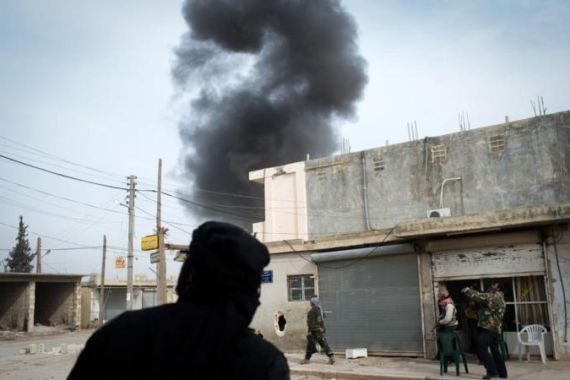The US and Syria: Six lessons from the past
There are six valuable lessons to be learned from Washington’s historical experiences in trying to manipulate regimes.

“If the United States drew back from military intervention because of… congressional second-guessing and Soviet bluster, the Turks… refused to demobilise the 50,000 troops they amassed along their Syrian frontier.”
These words read as though they’re from the morning’s paper. But this scenario played out in 1957 in Syria.
Washington had finally backtracked on instigating another coup d’état after its covert plans were exposed. It would have been the fifth attempted coup, successful or otherwise, since Syrian independence a decade earlier.
“At a time when most Americans couldn’t locate Syria on a map, the country had become an important geopolitical concern for the US and the site of America’s earliest covert action in the Middle East,” according to US historian Douglas Little.
Unfortunately, America rarely remembers how much Washington has mucked around in other countries even though there are valuable lessons to be learned from past experiences.
Lesson one: Decades of meddling have hardened Syrian distrust of foreign powers.
The first American-Syrian encounter occurred soon after the CIA was established in 1947 – merely a year after Syria gained its independence.
US government documents – kept secret for decades but declassified in 1991 – testify to a policy that was meant to keep the Syrian nationalists down, Soviets out, and Americans in.
To that end, the CIA assisted Colonel Husni Az-Zaim’s coup d’état to establish a “banana republic”-style dictatorship in 1949. And in the process, America opened the floodgates of military meddling in Syrian politics for decades to come.
Three years later, after another Syrian coup, Washington tried to court the new leader, Adib Al-Shishakly. When that failed, the CIA attempted further military coups in 1956 and 1957 – dubbed Operations Straggle and Wappen – unseat the nationalist President Shukri Al-Quwatly.
America’s covert operations backfired, pushing Syria into a union with Egypt and, eventually, Damascus into Soviet arms.
Lesson two: Don’t look at Syria through the prism of the Cold War.
In his 2009 Cairo speech to the Muslim world, President Obama recognised the injustice visited upon the likes of Syria during “a Cold War in which Muslim-majority countries were too often treated as proxies without regard to their own aspirations”.
|
|
| Empire Syria on the brink |
Yet six decades later, Washington and Moscow are applying the same polarised strategies of the 1950s, when the stakes are higher and the prospects for the region are ever more daunting.
Despite its stonewalling, Russia is not the Soviet Union. It’s a pragmatic power similarly apprehensive about extremist Salafis and chemical weapons falling into the wrong hands.
But President Obama and Putin need to meet face to face. A compromise on Syria between the US and Russia is still possible and could safeguard the state’s institutions, establishing a unity government for national salvation and reconciliation, paving the way to free elections.
Lesson three: Dictators or “transitional authoritarian leaders”, as Washington dubbed its clients in the 1950s, don’t transition to democracy.
Nor will Assad ever give up his power voluntarily.
For four decades, the Assad clan has played on nationalist sentiments, exploited geopolitical enmities and killed tens of thousands of Syrians to safeguard their dictatorship.
After more than a decade of false promises and two years of bloodshed, Bashar al-Assad has no place in Syria’s future.
Lesson four: Sectarianism is not an opportunity for the US to isolate Iran; it’s a regional disaster in the making.
The Assad regime’s unrestrained violence is pushing the country towards a full-blown civil war, emboldening radical Sunni Salafi groups and inflaming sectarian divisions.
A spill-over into neighbouring Iraq and Lebanon, which themselves suffer from mounting ethnic and religious tensions, is already underway and threatens to contaminate the whole Middle East and Gulf region with incalculable consequences for US foreign policy.
Lesson five: Better to remain detached but clear, than to raise false expectations.
Burnt by the Iraq War, Obama’s administration has wisely rejected the principle of putting boots on the ground in Syria. Instead, it pinned its hopes on the Syrian opposition, notably the National Coalition, which it deems the legitimate representative of the Syrian people.
But Washington’s reluctance to empower the anti-Assad camp for fear of strengthening the armed Salafi Al-Nusra faction – which it designated a terrorist organisation – has boomeranged. Instead, it has emboldened the Assad regime, expanded the Salafis’ reservoir of fresh recruits, and deepened suspicion among Syrians about Washington’s seriousness.
Moreover, by only drawing a red line at the use of chemical weapons, President Obama has, in effect, granted the Assad regime a green light to carry out terrible atrocities against its people through any other means.
When the American President asserts that Assad must step down, he is expressing more than a mere personal sentiment; he is putting US strategic stature on the line.
Lesson six: Don’t preach democracy while simultaneously distrusting the Syrian people.
A number of Syrian opposition leaders told me Washington had made any grant of meaningful support to them contingent upon their embrace of America’s agenda for Syria and regarding its future relations with Iran and Israel.
This will prove counterproductive. Previous administrations have tried and failed to dictate to the Syrians how to manage their national affairs.
It’s high time to allow Syrians the political freedom and peace they deserve, but have been denied since independence.
Marwan Bishara is the senior political analyst of Al Jazeera English and the author of The Invisible Arab: The Promise and Peril of the Arab Revolution.
Follow him on Twitter: @marwanbishara
